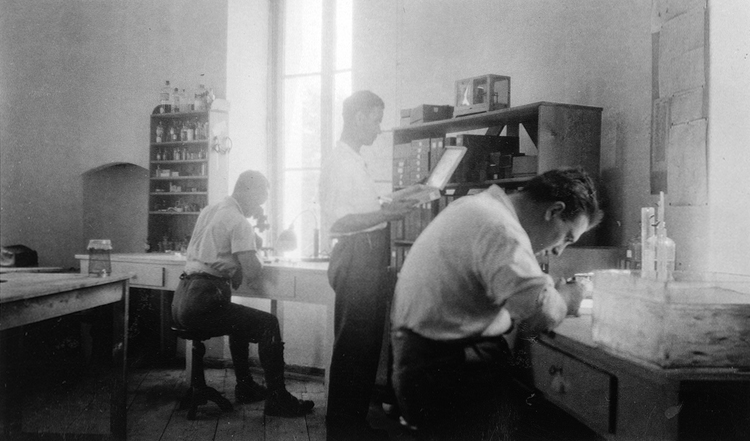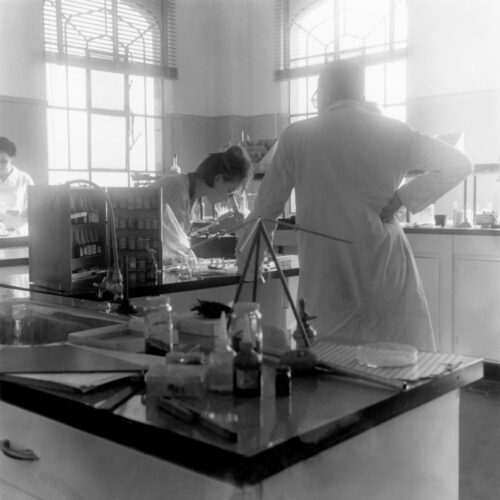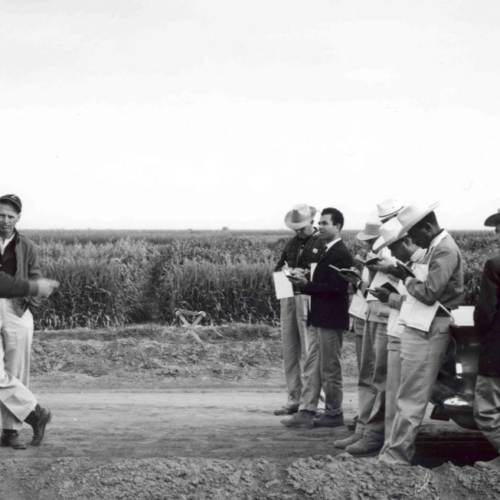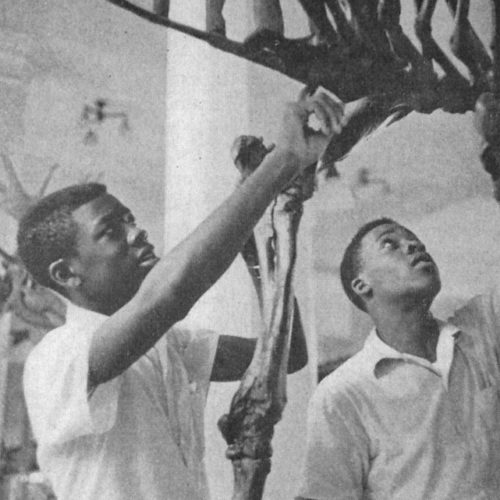Our New Research series presents recently published reports submitted by scholars who have received stipends from RAC to pursue their studies using our archival collections. In this month’s edition of the series, the authors have used the records of the Medical Letter, the Rockefeller Foundation, and the Rockefeller University, along with the papers of Donald R. Griffin and Detlev W. Bronk.
“A History of Diabetes at the Rockefeller Archive Center” by Rachel Meach
Rachel Meach is a Wellcome Trust Ph.D. student at the University of Strathclyde in Glasgow, Scotland. Her research on the history of diabetes treatments brought her to the Rockefeller Archive Center, where the editorial records of the pharmacology journal, The Medical Letter on Drugs and Therapeutics, are located. In these records, she explored the controversies surrounding the first oral medication for type-2 diabetes, tolbutamide, was developed in the 1950s.
Medical trials for this drug were made by the University Group Diabetes Program, a multi-institutional project. These trials created a swirl of controversy and were halted early due to indications of increased morbidity in the test group. The Medical Letter records reveal that this decision led to acrimonious debate within the medical community of diabetes specialists, as it inflamed the divisions between those who preferred to concentrate on diet and behavior modification for mild diabetes and those who focused on pharmaceutical solutions to the disease.
Rachel Meach observes that the debate continued until the 1970s, replete with congressional hearings, FBI investigations, and court rulings. Ironically, the debate on the value (or danger) of this drug was never actually settled, as the patent expired, and it was overtaken by newer generation of drugs for diabetes treatment.
“Beyond Eradication: Scientific Partnerships in Brazil and the Malaria Service of the Northeast” by Gabriel Lopes
In “Beyond Eradication: Scientific Partnerships in Brazil and the Malaria Service of the Northeast,” Gabriel Lopes focuses on an interesting episode in Brazilian public health history. In the 1930s, a new malaria-spreading mosquito from Africa suddenly showed up in northeast Brazil. This dangerous disease vector’s arrival complicated an already-difficult situation in the country’s campaign to eradicate malaria.
Dr. Lopes’s report presents how scientists from the Rockefeller Foundation’s International Health Division collaborated closely with Brazilian entomologists first, to understand the natural history of Anopheles gambiae and then, to work to eliminate it from the country. The documentation he found in the archives has been critical for his research on these efforts. He notes that these findings help recalibrate our understanding of the transnational role of entomologists conducting fieldwork in the swamps and ditches to confront Brazil’s public health challenges.
Gabriel Lopes is a postdoctoral researcher at the Fundação Oswaldo Cruz in Rio de Janeiro and has written extensively on the impact, implications, and history of A. gambiae’s accidental introduction to Brazil.
“Designing Agricultural Programs in Mexico and India: Challenges, Successes, and Missed Opportunities” by Gabriela Soto Laveaga
Since the RAC’s opening in 1975, many scholars have used the records of the Rockefeller Foundation for their studies of what is regularly called the “Green Revolution” of the postwar era and the role that philanthropy has played in its development. Much of this research has focused on the innovations and impact of new seed strains and technologies on food production or, more broadly, on the global implications of these endeavors.
In her research report, Gabriela Soto Laveaga concentrates on different aspects of the RF’s activities in this arena. “Designing Agricultural Programs in Mexico and India: Challenges, Successes, and Missed Opportunities” looks at the impact of these developments on domestic science and rural development in Mexico. Her report also discusses how the RF, trying to build on its experiences in Mexico for new agricultural initiatives in India, discovered that its assumptions did not necessarily match up with local conditions and needs or with the government’s perspective on its efforts.
Gabriela Soto Laveaga is a professor of the history of Science and the Antonio Madero Professor for the Study of Mexico at Harvard University.
“Donald Redfield Griffin, American Zoologist: Report on Archival Research” by Richard Nash
In “Donald Redfield Griffin, American Zoologist: Report on Archival Research,” Richard Nash brings to readers’ attention the fascinating intellectual journey of zoologist Donald R. Griffin. His report highlights his broader study of Griffin, the focus of his 2016 dissertation from Johns Hopkins University. Nash points out that Griffin was a key figure in twentieth-century animal behavior and sensory physiology research.
Dr. Griffin had coined the term “echolocation” to describe bats’ ability to use ultrasound to navigate at night. Griffin also made important contributions to our understanding of the mechanisms of bird migration. However, as a shock to the scientific community, this well-respected researcher broached a taboo topic with the 1976 publication of his book, The Question of Animal Awareness. In it, he presented an argument supporting scientific research in animal consciousness.
Dr. Nash learned through his thorough review of Donald Griffin’s papers at RAC, that this new direction was a not a sudden change of interest for Griffin. Instead, he was able to trace that for Griffin this was a gradual intellectual process in which he was ready to push the boundaries of scientific methodology into what he deemed as worthy, yet unexplored, areas of inquiry. Richard Nash connects Griffin’s intellectual re-orientation with a new research venue that supported his interests – the readiness of the newly redefined Rockefeller University, under the leadership of President Detlev Bronk, to encourage the crossing of traditional discipline boundaries to foster interdisciplinary research.
About the RAC Research Stipend Program
The Rockefeller Archive Center offers a competitive research stipend program that provides individuals up to $5,000 for reimbursement of travel and accommodation expenses. Learn more on our Research Stipend page



